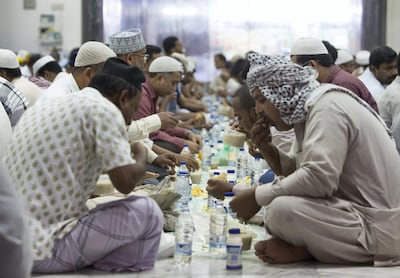Some return every year to the Kuwaiti Mosque in Deira, Dubai, for the broth that strikes memories of home. Others are drawn by news of an unusual soup.
Kanji, or rice porridge from India, resembles a shorba or stew with some describing it as liquid biryani. Curiosity draws construction workers, shop assistants, cleaners, family groups and tourists in well before iftar to reserve a place on plastic sheets spread across the twisty lanes of old Deira.
In readiness for iftar, men stack their footwear at the edge of the path and peel open oranges placed near the kanji containers, while the women make their way into the private areas of the mosque.
"Every Ramadan people come here, whichever part of the world they are from. Some men live alone and it is good to break their fast with others and then pray together," said Sofia Ahmed from Kenya, who attends the iftar meal after she has purchased abayas and Islamic clothes from the nearby souqs to ship back to her home country.
For Ethiopian housemaid Zebura Hassan, the kanji is a reminder of time spent with family. “When I finish working in houses, I like coming here. It makes me feel comfortable because we have food like this in my country,” said Ms Hassan, who has just completed a two-year contract in the UAE and is now headed back home.
School student Amina Yahya, her mother and aunt sat together with groups of other women on green carpets inside the mosque. “We come every year after we finish shopping. In India, we break our fast at home so it’s very different for us to join in together as a community,” the seventh grade pupil said.
Many UAE residents do not know about this distinctive Ramadan feature and visitors stumble on it when walking through less popular tourist districts away from the city’s main landmarks.
Rukaya Ilaisu from Ghana visited the mosque four years ago when she bought sweeping long dresses and jewellery from the neighbouring market. “This time I brought my sister along. I wanted her to taste this dish because it’s somewhat like a shorba we make, but still different. I like that people are from different countries but sit together and eat the same thing,” she said.
Outside the mosque, about 1,000 men lined up for more than an hour in queues that took them past small bakeries advertising warm flatbread from Pakistan, Afghanistan, Iran and Iraq.
It was the first taste of kanji for Babul Malang from Afghanistan, who lives in a room near the mosque. “I came to find out what is so special about this. I see the lines every evening but in 22 years I have never eaten this. I like it, I will come again with friends,” said the labourer, who spends his days lifting heavy cartons packed with clothes.
The practice of serving kanji, popular in mosques in South India's Tamil Nadu state, began 42 years ago near the Kuwaiti Mosque and continues every Ramadan through the work of volunteers from the Iman Cultural Centre.
_______________
Read more:
Government explains rules for volunteering in Ramadan
Dubai tightens food regulations during Ramadan
Kanji broth from south India adds unique flavour to Dubai iftar
_______________
Groups of shop assistants who live in labour accommodation in Sonapur queued up from 5.30pm, half-an-hour before the food parcels were distributed.
“We come early so there is no rush. This is not heavy food so it relaxes the stomach. It’s too far for us to go back to the labour camp to break our fast,” said Naushad Abdullah, pulling out a plastic bag to carry the kanji container to the shop to eat later with friends.
“We come here because this is like eating food from home, although we are far away.”


